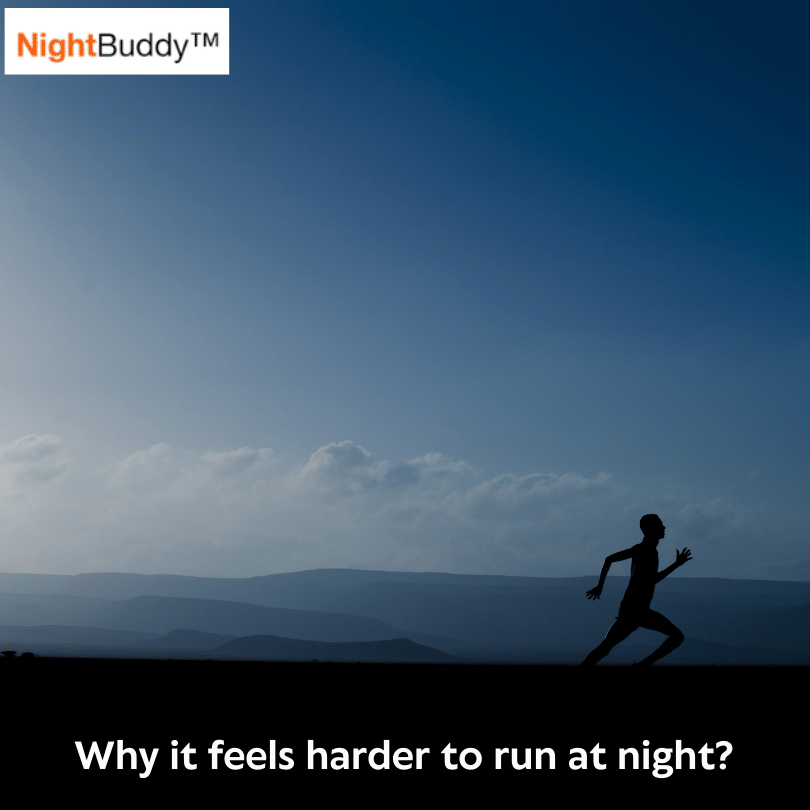Why Running at Night Feels Harder?
Running at night can take a toll on your body, and it often feels harder than running during the day. The difference in intensity between running in the morning day vs night runs is due to several factors. Firstly, our bodies naturally produce melatonin, which helps regulate sleep cycles.
Running when it's dark outside, our bodies are more likely to experience fatigue as this hormone is released into our bloodstream. This can make it harder to actively engage in physical activity, such as running.
In addition, our bodies run on a 24-hour cycle called the circadian rhythm.
This rhythm is regulated by light and darkness, so when it’s dark outside our bodies tend to slow down and prepare for sleep. This can make it difficult for us to keep up the same intensity level of running that we normally do during the day.
Here's the thing!
Running at night can be more challenging because of environmental factors. It’s usually harder to remain focused when it’s dark because there are fewer visual cues around us... Such as street lights!
Additionally, the temperature tends to drop at night, so we may have to battle the cold while running outside. Furthermore, running at night can be dangerous due to less visibility and possible threats from other people.
Overall, running at night can be a challenge for many reasons. It’s important to be aware of your body’s natural rhythms when running at night and to take extra precautions for safety.
With the right preparation and mindset, you can make the most out of your night runs.
Let the Night Buddy team share some tips!
5 Benefits of Night Running
Interesting facts about running at night and the benefits, supported by scientific studies:
- Night running can improve sleep quality - A study published in the Journal of Sleep Research found that regular exercise in the evening can improve sleep quality and duration, particularly for people with insomnia or sleep disturbances. Running at night can therefore help you sleep better and wake up feeling more rested
- Night running can help manage weight - A study published in the journal Sleep Medicine found that people who exercised in the evening had a lower body mass index (BMI) compared to those who exercised in the morning. This suggests that running at night may be more effective for weight management than running in the morning
- Running at night can enhance mood - Exercise is known to release endorphins, which can boost mood and reduce symptoms of anxiety and depression. A study published in the journal Mental Health and Physical Activity found that running in the evening was associated with greater improvements in mood compared to running in the morning.
- Night running can improve performance - A study published in the International Journal of Sports Medicine found that running performance was better in the evening compared to the morning, due to increased muscle strength and power output in the evening. This means that if you're training for a race or looking to improve your running performance, running at night may be more effective than running in the morning. So, running at night can help with weight loss... Not bad, right?!
- Running at night may improve cognitive function - A study published in the journal Neurobiology of Learning and Memory found that exercise in the evening improved cognitive function and memory consolidation in young adults. Running at night may therefore have cognitive benefits that extend beyond physical fitness.
Effects of Melatonin on Performance
Another significant factor tied to nighttime running is melatonin, known as the "sleep hormone." Melatonin is produced naturally by our bodies when it is dark outside, and it helps us fall asleep faster and stay asleep longer.
When we run at night, our melatonin levels may be higher, which can cause us to feel sluggish and less alert than we would during daytime workouts.
However, some runners may find that the release of endorphins during nighttime runs can counteract the effects of melatonin. Endorphins are feel-good hormones that can boost mood and energy levels, helping runners power through their workouts even when their melatonin levels are high.
Body Temperature and Nighttime Running
As our bodies cool down during the evening hours, our core temperature begins to drop. This decrease in internal temperature can cause us to feel colder and less pliable during nighttime runs.
Additionally, our bodies may need more time to warm up and adjust to the cooler conditions, leading to increased difficulty in performing our best.
However, some runners may find that cooler temperatures actually improve their performance. When our bodies are cooler, we may be able to maintain a faster pace for longer periods of time, as our muscles are less likely to overheat and fatigue. Additionally, cooler temperatures may help us feel more alert and focused, as our bodies are not expending as much energy regulating our internal temperature.
Overall, nighttime running can have both positive and negative effects on our physical performance. By understanding the science behind nighttime running, we can better prepare ourselves for these unique conditions and optimize our workouts for maximum benefit.
The Psychological Factors
Running at night can also present psychological challenges to athletes, which can further exacerbate the physical discomforts of nighttime workouts. However, with a little bit of understanding and preparation, these challenges can be overcome.
Perception of Effort
Studies have shown that runners perceive their effort levels at night to be higher than during daylight hours, even when their actual physical effort level remains the same. T
his psychological perception can cause runners to feel like they are working harder than they would be during daylight runs, which can lead to decreased motivation, more significant fatigue, and poorer performance overall.
One way to combat this perception of effort is to focus on your breathing and form. By taking deep breaths and maintaining proper running posture, you can help your body feel more relaxed and less taxed by the physical activity.
Additionally, setting small goals for yourself, such as reaching a certain landmark or running for a specific amount of time, can help you stay motivated and focused on the task at hand.
Fear and Anxiety in the Dark
Running in dimly lit areas or unfamiliar terrain can cause some runners to feel anxious and fearful. These psychological factors can lead to reduced confidence in our abilities, decreased motivation, and a higher perceived level of exertion.
These emotional discomforts can add up and negatively impact our performance, even if we are physically capable of the task.
To combat this fear and anxiety, it can be helpful to run with a partner or in a well-lit, familiar area. If running alone, consider carrying a personal safety device, such as pepper spray or a whistle, to help you feel more secure. Additionally, practicing relaxation techniques, such as deep breathing or visualization, can help calm your mind and reduce feelings of anxiety.
The Impact of Sleepiness and Fatigue
Finally, nighttime running can coincide with the hours when our bodies are naturally the most tired. This increased level of fatigue can make us feel more sluggish and less alert than we would be during daylight hours. When combined with the other factors outlined above, fatigue and sleepiness can cause us to feel like running at night is significantly harder than it truly is.
To combat this fatigue, it is essential to prioritize rest and recovery in your overall training plan.
Make sure to get enough sleep each night, and consider incorporating rest days into your workout schedule. Additionally, fueling your body with healthy, nutrient-dense foods can help provide the energy you need to power through nighttime runs.
While nighttime running can present its own set of challenges, it can also be a rewarding and peaceful way to stay active and maintain a consistent workout routine. By understanding and addressing the psychological factors that can impact our nighttime runs, we can overcome these obstacles and achieve our fitness goals.
What Does Running At Night Do To Your Body?
Running at night is not only an incredible experience, but it also has a lot of health benefits for your body. These benefits can include;
- weight loss
- increased stamina and strength
- ... and a boost at mental clarity
Perfect!
Also... You will sleep better knowing that you've successfully covered some distance instead of lying there awake thinking about how you didn't get to go running. Also, this discipline teaches us to push our own limits while being brave—not only in the physical sense but also mentally!
Final Thoughts From The Night Buddy Team
The Night Buddy team wants to remind all runners that nighttime running can be a great way to stay active and maintain a consistent workout routine. It is important to remember that nighttime runs come with their own unique challenges, so it is essential to prepare yourself mentally and physically for the task at hand. By understanding the science behind nighttime running, optimizing your nutrition and rest schedule, and setting realistic goals for yourself, you can have awesome night runs that benefit your helf!
Make sure to check out the best tips for running at night!





Leave a comment
This site is protected by hCaptcha and the hCaptcha Privacy Policy and Terms of Service apply.